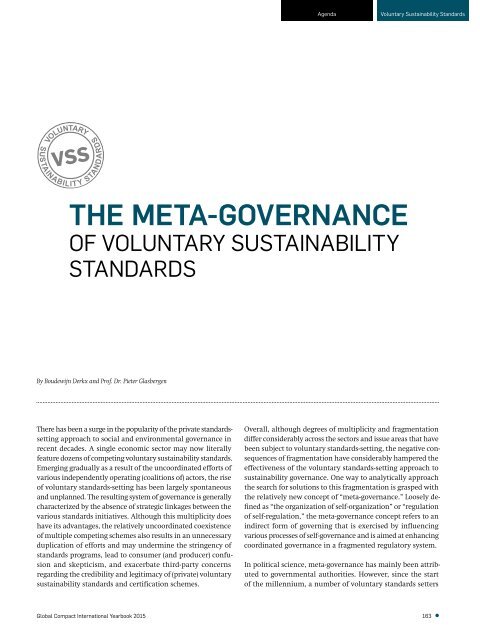Global Compact International Yearbook 2015
The Global Compact International Yearbook is with more than 400,000 readers one of the worlds leading CSR publications. In the new edition Leonardo DiCaprio speaks about business and sustainability. Declares DiCaprio: “We need to change our thinking and our sense of urgency .” Leonardo DiCaprio may be one of the world’s top movie stars, but he would rather be defined and respected more for his work as a committed environmentalist. Over the years, he has personally funded as well as helped to raise tens of millions of dollars for a variety of green-related causes. He believes that his greatest legacy will be the progress he has helped make toward safeguarding the planet against the ravages of global warming, pollution, and species protection. Other issues are: The state of CSR and 15th anniversary of the UN initiative Private Investment and Sustainable Development Voluntary Sustainability Standards Münster/New York 2015: 172 pages, paperback Publishing houses: macondo publishing/UN Publications Subscription (via UN Publications only): 30.00 USD (regular) 15.00 USD (reduced) ISBN13: 978-3-9813540-9-6 / ISSN-Print: 2365-3396 / ISSN-Internet: 2365-340x
The Global Compact International Yearbook is with more than 400,000 readers one of the worlds leading CSR publications. In the new edition Leonardo DiCaprio speaks about business and sustainability. Declares DiCaprio: “We need to change our thinking and our sense of urgency .” Leonardo DiCaprio may be one of the world’s top movie stars, but he would rather be defined and respected more for his work as a committed environmentalist. Over the years, he has personally funded as well as helped to raise tens of millions of dollars for a variety of green-related causes. He believes that his greatest legacy will be the progress he has helped make toward safeguarding the planet against the ravages of global warming, pollution, and species protection. Other issues are:
The state of CSR and 15th anniversary of the UN initiative
Private Investment and Sustainable Development
Voluntary Sustainability Standards
Münster/New York 2015: 172 pages, paperback
Publishing houses: macondo publishing/UN Publications
Subscription (via UN Publications only): 30.00 USD (regular) 15.00 USD (reduced)
ISBN13: 978-3-9813540-9-6 / ISSN-Print: 2365-3396 / ISSN-Internet: 2365-340x
- No tags were found...
You also want an ePaper? Increase the reach of your titles
YUMPU automatically turns print PDFs into web optimized ePapers that Google loves.
Agenda<br />
Voluntary Sustainability Standards<br />
VSS<br />
The Meta-Governance<br />
of Voluntary SustAINAbILIty<br />
Standards<br />
By Boudewijn Derkx and Prof. Dr. Pieter Glasbergen<br />
There has been a surge in the popularity of the private standardssetting<br />
approach to social and environmental governance in<br />
recent decades. A single economic sector may now literally<br />
feature dozens of competing voluntary sustainability standards.<br />
Emerging gradually as a result of the uncoordinated efforts of<br />
various independently operating (coalitions of) actors, the rise<br />
of voluntary standards-setting has been largely spontaneous<br />
and unplanned. The resulting system of governance is generally<br />
characterized by the absence of strategic linkages between the<br />
various standards initiatives. Although this multiplicity does<br />
have its advantages, the relatively uncoordinated coexistence<br />
of multiple competing schemes also results in an unnecessary<br />
duplication of efforts and may undermine the stringency of<br />
standards programs, lead to consumer (and producer) confusion<br />
and skepticism, and exacerbate third-party concerns<br />
regarding the credibility and legitimacy of (private) voluntary<br />
sustainability standards and certification schemes.<br />
Overall, although degrees of multiplicity and fragmentation<br />
differ considerably across the sectors and issue areas that have<br />
been subject to voluntary standards-setting, the negative consequences<br />
of fragmentation have considerably hampered the<br />
effectiveness of the voluntary standards-setting approach to<br />
sustainability governance. One way to analytically approach<br />
the search for solutions to this fragmentation is grasped with<br />
the relatively new concept of “meta-governance.” Loosely defined<br />
as “the organization of self-organization” or “regulation<br />
of self-regulation,” the meta-governance concept refers to an<br />
indirect form of governing that is exercised by influencing<br />
various processes of self-governance and is aimed at enhancing<br />
coordinated governance in a fragmented regulatory system.<br />
In political science, meta-governance has mainly been attributed<br />
to governmental authorities. However, since the start<br />
of the millennium, a number of voluntary standards setters<br />
<strong>Global</strong> <strong>Compact</strong> <strong>International</strong> <strong>Yearbook</strong> <strong>2015</strong> 163

















